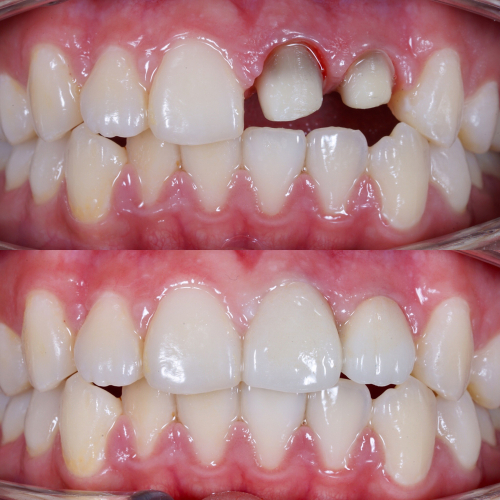What is a Dental Crown?
A dental crown is a prosthetic restoration that covers and protects a damaged or weakened tooth. It is custom-made to match the size, shape, and color of your natural teeth, providing strength, durability, and aesthetic improvement. Dental crowns can restore the function and appearance of a tooth while preserving its remaining structure.
When is a Dental Crown Needed?
- Tooth Decay: Crowns are used when a tooth has extensive decay that cannot be repaired with a filling.
- Fractured or Broken Teeth: Teeth that are cracked, chipped, or broken can be restored with crowns.
- Root Canal Treatment: After a root canal, a crown is often placed to protect the treated tooth.
- Large Fillings: When a large filling compromises the structural integrity of the tooth, a crown can provide reinforcement.
- Cosmetic Enhancement: Crowns can be used to improve the appearance of misshapen, discolored, or severely stained teeth.
The Dental Crown Procedure:
- Evaluation: Your dentist will examine your tooth, take X-rays, and discuss treatment options with you.
- Tooth Preparation: The tooth receiving the crown will be reshaped to accommodate the crown’s thickness.
- Impression: An impression of your tooth will be taken to create a precise mold for the dental laboratory.
- Temporary Crown: While your permanent crown is being fabricated, a temporary crown will be placed to protect the tooth.
- Crown Placement: Once the permanent crown is ready, your dentist will remove the temporary crown and bond the permanent one in place using dental cement.
- Adjustment and Polishing: The crown will be checked for proper fit, bite, and appearance. Adjustments may be made, and the crown will be polished for a natural finish.
LEARN MORE ABOUT THE DENTAL CROWN PROCEDURE
Types of Dental Crowns:
- Porcelain-Fused-to-Metal (PFM): These crowns have a metal substructure for strength with a porcelain exterior for a natural appearance.
- All-Ceramic or All-Porcelain: These crowns offer excellent aesthetics, mimicking the translucency and color of natural teeth.
- Metal Crowns: Made of alloys like gold or base metals, they are known for their durability and strength.
- Zirconia Crowns: These crowns are made of a strong ceramic material, providing both strength and esthetics.
Caring for Your Dental Crown:
– Practice good oral hygiene by brushing your teeth twice a day and flossing daily.
– Avoid chewing hard or sticky foods that may damage the crown.
– Schedule regular dental check-ups to ensure the crown’s stability and overall oral health.
– Wear a nightguard if you grind or clench your teeth to protect the crown from excessive force.
Benefits of Dental Crowns:
- Tooth Protection: Crowns provide a protective layer over damaged or weakened teeth, preventing further decay, fractures, or wear.
- Improved Functionality: Dental crowns restore the shape, size, and strength of damaged teeth, allowing for better chewing, biting, and overall oral function.
- Aesthetic Enhancement: Crowns are custom-made to match the color and shape of your natural teeth, improving the appearance of discolored, misshapen, or poorly aligned teeth.
- Durability: With proper care, dental crowns can last for many years, providing long-term functionality and aesthetics.
- Versatility: Crowns can be used to address various dental issues, including tooth decay, cracks, fractures, large fillings, root canal-treated teeth, and cosmetic enhancements.
- Stain Resistance: Depending on the material used, dental crowns can be highly resistant to staining, maintaining their color and brightness over time.
Risks and Considerations of Dental Crowns:
- Sensitivity: Some individuals may experience temporary sensitivity to hot or cold temperatures after crown placement. This usually subsides on its own but can be managed with desensitizing toothpaste or dental treatments.
- Allergic Reactions: In rare cases, individuals may have an allergic reaction to the materials used in the crown, such as metals or dental ceramics. It is essential to discuss any known allergies with your dentist.
- Tooth Sensitivity or Nerve Damage: Preparing the tooth for a crown may involve removing a portion of the tooth’s structure, which can result in temporary or, in rare cases, persistent tooth sensitivity. In rare instances, nerve damage may occur during the preparation process.
- Tooth Decay: While dental crowns protect the underlying tooth, proper oral hygiene is crucial to prevent decay at the crown’s margin or in the surrounding teeth.
- Crown Failure or Damage: Although rare, dental crowns can fracture, chip, or become loose over time. This is more likely to happen with excessive force, grinding, or biting on hard objects.
- Adjacent Tissue Irritation: In some cases, the gum tissue around the crown may become irritated or inflamed. Maintaining good oral hygiene and regular dental check-ups can help prevent or address such issues.
Remember, every case is unique, and your dentist will recommend the most suitable type of crown for your specific needs. If you have any questions or concerns, consult with your dentist, who will guide you through the process of getting a dental crown and help you achieve a healthy and confident smile.
